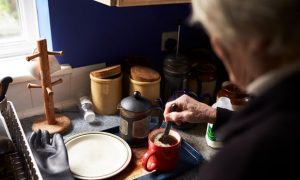Latest News
Step-change needed in support for carers of terminally ill, argue academics
The document, by Dr. Gail Ewing from The University of Cambridge and Professor Gunn Grande from The University of Manchester, argues a major cultural shift among staff is desperately needed to help carers.
Improvements in structures and internal processes are also among the 10 recommendations in the National Institute for Health Research and Hospice UK funded report to improve the way healthcare organisations—such as hospices, hospitals, community nursing and General Practice – to support carers’ needs.
Other recommendations include:
- Training staff in carer assessment and support
- Making more time available for staff to support carers
- Setting up a system to record carer information
- Consistent identification of carers
- Routine identification of carers’ needs.
The report, which was written following work with carers and clinical staff, highlights how family members often play a pivotal role in supporting their loved ones at the end of their life.
And that, say the academics, provides more care at home and easing pressure on hospitals.
One of the carers in the report told how it never occurred for him to ask the doctor about his own problems.
Another carer said: “I needed some sort of human support, one-to-one support, somebody to come round and say, ‘I’ve come to see you, how are you getting on?’ and just to make you feel that you are needed and that somebody is looking out for you.”
And a clinician described how sections in medical notes for carers’ details were not being completed.
The report’s publication is to be followed by a national survey of hospice providers to establish what is currently in place to assess and support carers, compared against these recommendations.
Dr. Sarah Russell, Head of Research at Hospice UK and a member of the expert advisory group for the report, said:
“The needs of carers of people approaching the end of life, which are distinct from other types of carers, have long been overlooked. While there have been positive developments in policy in recent years, these have not translated into service delivery. This report aims to tackle that gap and provide healthcare organisations with practical guidance on what needs to change.
“With an ageing population and rising pressures on health and social care services, more people will be called upon to care at home for older relatives with complex, multiple conditions. It is vital they get the person-centred support they need so they can fulfil their caring role effectively and also maintain their own physical and mental health and wellbeing.”
Professor Gunn Grande said: “As we say in our report, if we don’t support carers, carers aren’t going to support the patients, and then we’re all going to be struggling. Indeed, professionals who work in palliative care will subscribe to the ethos of being there for the family, not just the patient. But it’s very sad that this strong philosophy is not being consistently put into practice.”
Dr. Gail Ewing said: “Perhaps the more difficult challenge is resolving where carers ‘fit’ within end of life care: whose responsibility are they? “That means we really must answer the question of whether or not carers are to be viewed as true clients of palliative care services, so that we can legitimise their assessment and support. Ultimately this needs to be reflected in commissioning, specific funding for carer assessment and support in end of life care.”

Carers UK – State of Caring Survey 2018
This is the most extensive survey into carers’ experiences in the UK. As a result, it will take at least 20 – 30 minutes to complete – so grab a cup of tea and get comfy! Please note that this survey is for those caring unpaid for a disabled, older or seriously ill relative or friend.

Would you like to see a new play about carers at the Southwark Playhouse?
The Fall takes a funny, moving and candid look at young people’s relationship to older people, confronting the frightening prospect of ageing in a country undergoing a crises of housing and care.
Written by Olivier Award nominated and Bruntwood prize winning writer James Fritz (Parliament Square, Ross and Rachel), The Fall was commissioned as part of National Youth Theatre’s 60th anniversary and premiered at the Finborough Theatre in 2016. Directed by Bryan Forbes 2015 Bursary recipient Matt Harrison, whose recent assistant director credits include Kneehigh’s award-winning The Flying Lovers of Vitebsk and the West End production of Lady Windermere’s Fan.
If you would like to attend please contact Dana Brennan – [email protected]. These tickets are first come first served and are strictly limited to one ticket per carer.

Children of alcoholic parents to get help in £6m scheme
The £6m package of measures is designed to help the estimated 200,000 children in England living with alcohol-dependent parents, offering rapid access to support and advice.
Announcing the measures on Monday, the health secretary, Jeremy Hunt, said the consequences of alcohol abuse were “devastating for those in the grip of an addiction, but for too long the children of alcoholic parents have been the silent victims. This is not right, nor fair.
“These measures will ensure thousands of children affected by their parent’s alcohol dependency have access to the support they need and deserve.â€
Hunt paid tribute to Jonathan Ashworth, the shadow health secretary, who had previously spoken of an upbringing in which his father would fall over drunk at the school gates. In an interview with the Guardian in 2016, Ashworth also described how he would return home to a fridge stacked with cheap alcohol and no food.
“Some things matter much more than politics, and I have been moved by my Labour counterpart Jon Ashworth’s bravery in speaking out so honestly about life as the child of an alcoholic,†Hunt said.
The programme will include rapid access to mental health services and support for children and their families where there is a dependent drinker; funding to identify and support at-risk children more quickly and early intervention programmes to reduce the numbers of children needing to go into care.
The government has also appointed Steve Brine as a dedicated minister for children with alcohol-dependent parents.
Of the 200,000 children in England living with alcoholic parents, the NSPCC has reported a 16% rise in calls involving alcohol or drug abuse in recent years. The charity receives one call every hour related to drug or alcohol abuse.
Research shows that children of alcoholics are twice as likely to have problems at school, three times as likely to consider suicide and five times more likely to develop an eating disorder. More than a third of all serious case reviews for children involve a history of parental alcohol abuse.
The Labour MP Liam Byrne, the founder and chair of the cross-party group in parliament for children of alcoholics, welcomed the measures.
‘We know as children of alcoholics that we can’t change things for parents, but we can change things for our country’s kids,†he said. “This is a huge step forward for Britain’s innocent victims of booze, the kids of parents who drink too much and end up scarred for life.â€

London Voices 2018: The London Citizen Journalism Competition
What are the benefits?
- It’s FREE to enter
- No previous experience required, just an enthusiasm for citizen journalism!
- Your work will get seen by a range of journalism experts
- You could win amazing prizes and have your entry showcased on the London Voices website
See below for details of the awards and prizes on offer!
What are the aims of the competition?
London Learning Foundation is proud to be building on last year’s successful competition to support London’s aspiring citizen journalists (whether you want to be a professional, contribute to citizen papers, or just find a way to voice your opinion on London issues).
We want to support new journalism talent, and encourage all Londoners to have a go at producing news articles about the issues that are important to them. Whether you are interested in writing, video, radio, photography or working online, this is your opportunity to talk about stories which have caught your imagination. There are thousands of stories in London which are not being heard. This competition is about changing that!
We welcome entries from complete beginners, students and those getting started in the world of journalism, as well as anyone who wants to have a go at being a citizen journalist.
No previous experience of journalism is required. All you need is enthusiasm!
Please note we do not permit you as an entrant to use your entry as a platform to express discriminatory or prejudicial views or to incite hatred, violence or criminal activities whether this be actual, virtual or accidental. This is not a vehicle for political views or for lobbying.
Entrants must:
- Be over 14 years old
- Live, work or study in greater London
- Not be in full-time paid journalism work
How can I enter the competition?
1.   Choose your theme
Your entry can be about anything that affects London, including sports, art, culture, politics, lifestyle, entertainment, community, environment, fashion, science, travel, or anything else that is important to you.
As a guide we are looking for a maximum of two thousand words for a written piece of journalism, 10 photographic stills, or 5 minutes of video or audio material.
2.   Choose your journalistic media
Your entry can use whatever media you are interested in. Last year’s competition entrants wrote traditional news or magazine-style articles, produced videos or audio articles, or told their story through photo journalism. You decide what works best for your story.
Click here to have a look at the winners from last year
3.   Download and complete the Competition Entry Form
Download the Competition Entry Form here.
London Voices Competition Entry Form – 2018
Competition Guidelines and Rules
Email your completed form to Amanda at [email protected]
4.   Send us your competition entry form along with your entry by 5pm on Monday 21st May 2018
Email your written entry to [email protected], or send us a link if your article is published online. If your entry is a video or audio file, upload it to our Dropbox account at https://www.dropbox.com/request/eaQv9R9Rn8g2avKacH11
Please note, by entering this competition, you are agreeing that your work can be freely exhibited and used for promotional purposes by London Learning Foundation and other partners. No personal details will be used or published without your permission.
What are the prizes?
Sponsors are still coming on board, but we have the following awards confirmed:
Award: Best Urban Video
Sponsor: Your News UK TV www.ynuk.tv
Prize: You choose! Spend time on location with YNUK.tv’s editor (and renowned international broadcast journalist) Rosie Hayes  or guest edit a day’s news. All this, plus see your winning video hosted on the news site, and take home £50 as well!
Award: Best Written Piece (either online or in print)
Sponsor: Journo Resources http://www.journoresources.org.uk/
Prizes: There are two prizes for this award, which can include a feature story, a news story or an investigation. Please click Journo Resources prize for more information.
Prize one is for those with no formal journalism training or experience. Win a one-on-one clinic with the founder of Journo Resources, Jem Collins to go through your CV, and get advice on how to pitch ideas to outlets. Journo Resources will also take a professional byline photo for you, and chat about routes into the industry, plus provide free coffee!
Prize two is for those who are studying journalism, or have had some training / experience (eg. student media). Win a pair of tickets to Byline Festival, an independent journalism festival on the bank holiday weekend of 24-27 August.
Award: Best Multi-Media Journalist
Sponsor: London South Bank University’s Journalism Department http://www.lsbu.ac.uk/
Prize: Win a day in the Elephant Studio Newsroom, gaining work experience and learning from the best!
Award: Best Young Journalist aged 14-18
Sponsor: Update News https://www.updatenews.co.uk/
Prize: Guest editing a live broadcast on the BRIT live TV show, along with work experience in the Update News studios. Plus get advice and guidance from Jamie Moreland, the Producer of both Update News and The BRIT Live. For more information on this prize, please click here.
Award: Best Audio Journalist
Sponsor: Panda Radio http://pandaradio.co.uk/
Prize: You choose! Spend a week with the breakfast show on Panda Radio, or benefit from some mentoring from the team

Young Carers Conference: Barriers to Employment
Bringing together young people, policy makers, practitioners, employers, researchers and academics, the conference will present cutting edge research and debate youth-led initiatives locally from in the borough and wider afield from across the EU. The conference proceedings will contribute to reforms required to better support young people into work, training and further education.
The conference is organised within the framework of the DCLG supported project “Young Carers Matter†and will draw from the findings of this project and the previous Erasmus+ KA2 funded Care to Work project that explored the needs, challenges and opportunities of young BAME carers in their transition to responsible adulthood and their fair access to employment, education and training. The conference will also inform the future Care to Entrepreneurship (C2E) project, funded under the Erasmus+ KA2 scheme which launches next month.
ACCREDITATION, CERTIFICATION & NETWORKING
The conference has been independently certified as conforming to universally accepted Continuous Professional Development (CPD) guidelines. CPD certificates will be awarded on the day to all delegates who have registered, donated and attended the whole day.
For young people the conference will qualify for Youth Mark accreditation.
There will be opportunities for young carers and employers to network.
REGISTRATIONÂ
To register for the event, please click here.
Venue
Canda Water Library, 20 Surrey Quays Road, SE16 7AR
view map

Rementia: is it possible to reverse the symptoms of early-stage dementia?
As we get better at living longer, the number of people living with dementia rises. Globally, an estimated 46.8 million people live with the condition.
But dementia has not always been understood in the way it is today. For a long time, it was thought of as a mental health disease and an inevitable consequence of ageing. During the 20th century, however, advances in medicine and research meant that dementia came to be understood as a set of cognitive and functional symptoms, caused not only by neurological conditions, but also by the physical, social and psychological experience of the individual.
The latest thinking in the field of dementia care, to which I have devoted my career, is the new understanding that while we can support individuals to maintain their current abilities for longer, we can also – in some cases – work to restore lost functions.
When I first worked as an occupational therapy assistant in the 1980s, I was shocked by the treatment of those living with dementia. Too often, people had simply been given up on.
This was not because of any negligence by individual care workers – the whole culture was different then. Hospital services were described starkly as “psycho-geriatricâ€, and the overriding purpose of dementia care was to keep people safe, secure and occupied – essentially appeasing them with entertainment, rather than stimulating them and helping them retain functions wherever possible.
In recent years, this approach has had a radical overhaul. The understanding of dementia as a neurological issue and a combination of many different causes has been adopted by the mainstream. Pioneers, such as Prof Tom Kitwood, have shown that the symptoms of dementia are determined by people’s specific neurological impairments, by their own personality and life history and, crucially, by social psychology: how we treat those living with dementia.
This was a huge wake-up call for the field in the 1990s, and a formative moment for those, such as myself, who specialise in dementia care. Once we better understood what dementia is and the many factors that can cause it, researchers began to explore “rementia†– the possible reversal of some of the symptoms.
Central to this approach is the use of occupational therapy. In practice, occupational therapists work with those with early-stage dementia to understand each individual’s set of symptoms and where they would like to improve and regain functions. Some, for example, may want to learn how to use a mobile phone, some may want to relearn how to make a cup of tea, and others may be desperate to recall the names of their grandchildren.
The therapist will then help each individual break down the specific activity into its component parts, analyse them, and put them back together to relearn them. Making a cup of tea, for example, is an incredibly complex task when broken down into each tiny movement and decision required: reaching for the kettle, gripping the handle, deciding how much water to use.
Underlying the practice are the latest developments in neuroscience, which explores how functions can be regained by enabling new links between neurons to work in place of the damaged ones. This phenomenon of rewiring the brain is well understood but has not yet been applied widely to dementia care, where it has huge potential to help people in the early stages of the condition.
Several studies I have been engaged in are now working to bring the “rementia†model and the use of occupational therapy into the dementia care mainstream, and ensure that the benefits of this revolution in dementia care reach as many people as possible.
- Jackie Pool is the head of memory care and programming at Sunrise Senior Living, and is the author of The Pool Activity Level Instrument for Occupational Profiling.

Thousands of patients to get personalised NHS budgets
Hundreds of thousands of people with mental health conditions and physical disabilities could be given the option of a personalised NHS budget for their own care needs under government proposals.
People with learning difficulties and dementia are among around 350,000 who could have the right to select and pay for treatments that improve their health and wellbeing through a bespoke care plan agreed with medical professionals. For children and people unable to manage the money, parents or carers will be able to manage the budget.
Ministers believe the measure will improve patient satisfaction with the NHS and harmonise health and social care budgets. Currently, about 23,000 people have personalised NHS budgets, but ministers want to expand the scheme.
The government hopes that care provided to the qualifying groups on the NHS will improve, after complaints about current standards of treatment. Tens of thousands of pounds could be made available to a single person. People who qualify for the personal healthcare budget would have the option of receiving the money through a direct payment, giving the money to a third party to manage or leaving it with the NHS to control.
The move has received the backing of the health secretary, Jeremy Hunt, and Simon Stevens, the head of the NHS. It will be set up later this year when the government announces changes to health and social care.
Caroline Dinenage, the minister for care, said: “If you have complex needs, our current health and social care system can be confusing, so it’s right people should be involved in the important decisions about how their care is delivered.
“These changes will put the power back into the hands of patients and their families, potentially allowing up to 350,000 extra people to take up a personal health budget if they so wish.â€
One example of the existing NHS scheme mentioned in the government consultation is of a 90-year-old woman with Alzheimer’s disease who uses the personal health budget to pay for care at home, osteopathy treatment and respite care for her family. The woman has not had any emergency admissions to hospital or nursing home since she was given the personal budget, according to the report.
Dinenage said: “This would not only improve quality of life and the care they receive, it will offer good value for money for the taxpayer and reduce pressure on emergency care by joining up health and social care services at a local level.
“As the health and social care secretary set out in his speech last month, we’re determined to focus care around the person, and this will form one of the key principles of reform for the sector in a green paper published this summer.â€
However, Caroline Abrahams of Age UK told the Times: “Older people in declining health with social care needs generally tell us they are not very interested in getting involved in organising the services they receive. They just want them to be effective and joined up, and delivered by kind and skilful professionals.â€

Survey about services for families of disabled children
Please only answer this survey if you live in England.
You do not have to take part in this survey if you don’t want to. If you change your mind during the survey, you can stop.
Your answers to this survey are confidential. This means that we will not use your name when we share our findings.
DCP will keep your survey answers in a safe place for 5 years. After that they will be destroyed.
If you have any questions about the survey, please email us at [email protected]

